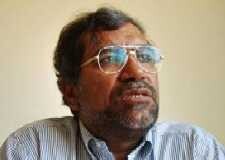The Electronic Intifada 23 July 2003

Khalil Shikaki
Former US Assistant Secretary of State Richard Murphy, writing with David Mack in the International Herald Tribune, seized upon the result to propose that the refugee issue be resolved by inviting the international community to “help fund the permanent settlement of Palestinian refugees either in the new state of Palestine or in third countries.” In exchange, the United States would pay to resettle in Israel 200,000 illegal Jewish settlers now in the Occupied Territories. Murphy and Mack were silent about the remaining 200,000 settlers concentrated around Jerusalem, and one can infer that they would remain where they are.
M.J. Rosenberg of the left-leaning Israel Policy Forum also welcomed Shikaki’s poll, saying: “His findings rebut one of the central tenets of the anti-Israel argument and is (sic) a threat to rejectionist militants. Palestinians are not, apparently, set on returning to homes they left over 55 years ago. On the contrary, they recognize both the reality of Israel and the fact that the partition of Palestine is final and permanent. The terror groups which are attempting not merely to roll back 1967 but also 1948 do not represent Palestinian opinion. Essentially, they do not have much of a constituency.” Hence, according to Rosenberg, for Palestinian refugees to insist on their fundamental human rights somehow aligns them with “terror groups” and “rejectionists.”
How could it be that for decades everyone — not least the refugees themselves — mistakenly believed that granting rights to millions of Palestinian refugees was the key to the Palestinian-Israeli conflict? How is it that now a single, dubious poll threatens to make the entire problem disappear into a puff of smoke? A closer look at the poll will help clear the fog.
Shikaki has not published his entire study, but only an extended press release highlighting its key results. This makes it difficult to evaluate his methodology. However, in the press release he does present in full the central question given to respondents, and it is worth looking at closely. It begins:
“We will now read you a proposed solution to the refugee problem that was published in Palestinian papers in light of the Taba negotiations in January 2000. We will then ask you a few questions:
“The establishment of a Palestinian state in the West Bank and Gaza Strip and Israeli recognition of UN Resolution 194 or the right of return. But the two sides would agree on the return of a small number of refugees to Israel in accordance with a timetable that extends for several years. Each refugee family would be able to choose one of the following options:
“(1) Return to Israel in accordance with an annual quota and become an Israeli citizen; (2) Stay in the Palestinian state that will be established in the West Bank and Gaza Strip and receive fair compensation for the property taken over by Israel and for other losses and suffering; (3) Receive Palestinian citizenship and return to designated areas inside Israel that would be swapped later on with Palestinian areas as part of a territorial exchange and receive compensation; (4) Receive fair compensation for property, losses, and suffering and stay in the host country receiving its citizenship or Palestinian citizenship; (5) Receive fair compensation for property, losses, and suffering and emigrate to a European country or the US, Australia, or Canada and obtain citizenship of that country or Palestinian citizenship.”
The number of respondents choosing option (1) was 23 percent in Lebanon, 12 percent in the West Bank and Gaza, and 5 per cent in Jordan.
The problem with these options is that they are rigged in such a way as to produce a result where most Palestinians choose not to return.
First, the opening paragraph states a priori that only a “small number” of refugees will actually be allowed to return and that those lucky few may have to wait for many years. Second, the question offers a choice between return and compensation as if refugees are entitled to only one or the other.
UN General Assembly Resolution 194 of December 1948, which applies the right of return to Palestinians, states: “Refugees wishing to return to their homes and live at peace with their neighbors should be permitted to do so at the earliest practicable date, and compensation should be paid for the property of those choosing not to return and for loss of or damage to property which, under principles of international law or in equity, should be made good by the governments or authorities responsible.”
The original homes and property of many Palestinian refugees were seized or destroyed by Israel. That is no less true for refugees who might choose to return as it is for those who do not. What this means in practice is that even those who exercise their right of return are legally entitled to compensation for property that no longer exists, which was damaged, or which was taken by Israel.
Yet the way Shikaki’s options are formulated, they deny due compensation to those Palestinians choosing to return to Israel (though Palestinians opting to live in Israeli territory destined to be swapped would be eligible). For Palestinian refugees, therefore, the prospect of returning penniless and homeless to an Israel in which they are legally second-class citizens is bound to be far less appealing than the other choices. Why should Palestinians who choose to go to the Palestinian state “receive a fair compensation for the property taken over by Israel and for other losses and suffering,” while those who go to Israel get nothing? How has their suffering been any less severe during the past decades?
Such polls as Shikaki’s don’t measure public opinion, they shape it and steer public policy in a predetermined direction.
Yet even if it were true that “only” 10 percent of refugees seek to return to present-day Israel, this translates into almost 400,000 people — a number Israel could easily absorb. If that is the case, the Israelis have even less of an excuse to continue denying the right of return to those wanting to exercise it. Whatever the true numbers wanting to return, the refugees cannot be wished or polled away. Peace must be made with them, not against them, and that means offering them real choices that reflect their inalienable rights.
This article first appeared in The Daily Star
Related Links:



